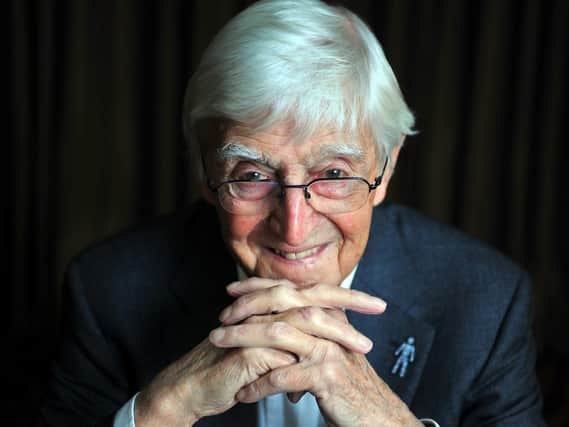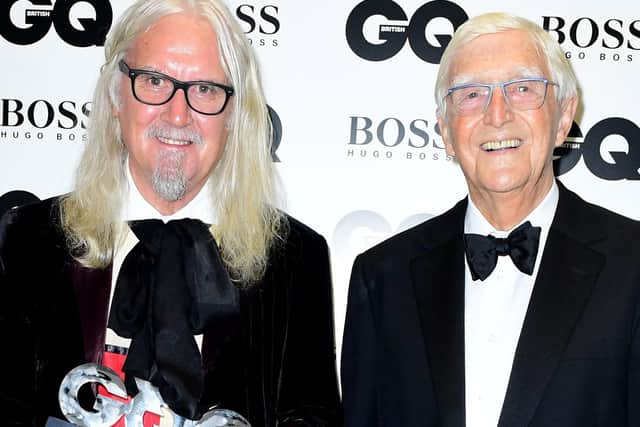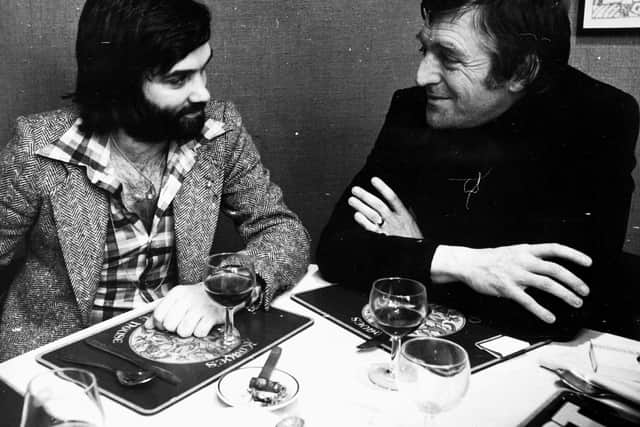Sir Michael Parkinson on 50 years of the Parkinson show and interviewing everyone from Ingrid Bergman to Muhammad Ali


Since then he’s interviewed more than 2,000 of the biggest names in cultural life, from Orson Welles to Tom Cruise, John Lennon to Bing Crosby and Lauren Bacall to Madonna; endured moody or taciturn guests, and famously survived an attack in the vitals by a wanton emu.
It has, as Parky himself might say, been quite a life. And it’s one he will be talking about with his son, Mike, in his An Evening with show which heads to Yorkshire this autumn.
Advertisement
Hide AdAdvertisement
Hide AdThe tour coincides with the 50th anniversary of Parkinson and not surprisingly he’s looking forward to returning to his home county. “I’m very nostalgic about the North and always have been. I think most Yorkshiremen are,” he says. “I love going back. I love hearing the accents and the humour, and I find it very reassuring. You live in a bit of a goldfish bowl when you do television and you can easily lose contact with that which got you there in the first place.”


The Parkinson show was something of an institution and made its host the king of Saturday night telly. Strange then, that it began life as a 10-week summer filler experiment by BBC producers. “They came up with the idea and we did it and thank God they did... my children have been forever grateful,” he says, with a chuckle.
“We didn’t know what we were doing to begin with. I used to do little pieces to camera which I thought were funny and witty and were dire because I didn’t know how to do them.
“But the BBC was very patient and they nursed it and it grew organically. You can push a show as much as you like but in the end there has to be something in the chemistry between you and the guests and the audience.”
Advertisement
Hide AdAdvertisement
Hide AdThe show quickly proved a hit with viewers and ran for 11 years on the BBC until 1982 and returned in 1998 lasting for several years before he moved across to ITV, finally calling it a day in 2007.


For Parky, the show was a chance to meet some of his heroes. “I remember saying, ‘ladies and gentlemen, my next guest is Jimmy Stewart.’ And on walks this legend. We had people like James Cagney. I used to watch him from the back row of the cinema in Cudworth and look up at him with awe. And there I am about to interview him and he’s sat in front of me smiling. I mean come on, you’d have to be made of stone not to respond to that.”
It was the same with many of Hollywood’s female icons. “We had Ingrid Bergman on and when she walked towards me I nearly bloody fainted. But that was the joy of doing the show. When you’re doing something like that you’re 90 per cent an interviewer and 10 per cent a fan.”
Despite the fact that many of his guests were big stars, it’s not always easy being interviewed live on TV. “I used to feel sorry for the people who came on because it’s a rough job just walking down those bloody stairs,” he says.
Advertisement
Hide AdAdvertisement
Hide Ad“They stand at the top, there’s a band playing loudly, there’s a mic on every orifice, you’re made up so much you can’t move your face muscles, there’s 500 people in the audience and ten million people watching at home. And then someone says ‘have a good time.’ Are you joking?”
Which is where the interviewer’s skills come into play. “You ask simple and sensible questions about their life. They’ve got to feel like they’re in a car and they’re being driven safely.”
Inevitably, though, not every interview went well. “I’ve had situations where one guest turned his chair so his back was to his friend who’d been on before him and you have to deal with difficult situations. You have to be prepared for people not to like the other guests and not to like you. That happened to me on two or three occasions. Sometimes it was pretend, I hope, like with Muhammad Ali, and sometime it was real, where people genuinely didn’t like the experience.”
Ali, he says, was a born performer. “He was a complicated, complex human being. There were parts of him that were atrocious quite frankly, that were racist, rude and not to be contemplated in polite company.
Advertisement
Hide AdAdvertisement
Hide Ad"On the other hand, there was fascination about him. He was a great, great star. And when he walked on the public didn’t care about what he might have said, all they saw was this giant, beautiful man who would actually take the p*** out of me incessantly. That’s what they loved and in that regard he was a genius, as well as being the best fighter I ever saw.”
Having a good interviewee certainly makes the interviewer’s job easier.
“Peter Ustinov was in a league of his own, but there brilliant people like Jacob Bronowski and many others. I interviewed W H Auden, and he wasn’t brilliant, or funny or witty, he wasn’t Tommy Cooper, but my god, if you listen to what he was saying about language. I asked him what the poet’s purpose was and he said ‘the preservation of language’ and we talked about that. He was fascinating.”
There were a few big stars that got away. He didn’t interview Frank Sinatra and Louis Armstrong (he tried to get the latter on his show but was beaten to it by his friend and rival David Frost). “Sinatra was the big one, but I don’t spend my waking days thinking about who I didn’t interview.”
Advertisement
Hide AdAdvertisement
Hide AdInstead he and his son Mike have been trawling through his past shows to create a new compilation. “It’s always hard watching yourself on television and coming to a conclusion, particularly one which sums up fifty years of what you did. But when I look back my main thought is that it has been worthwhile. There’s lovely stuff in there, and some cringe worthy stuff too. But it doesn’t matter.”
These days talk shows have changed immeasurably. “I’d say they’ve changed for the worse, but you’d expect me to say that because nowadays there isn’t a show like mine, or what David Frost or Alan Whicker used to do. It’s a different kind of approach and I wouldn’t fit in easily to this new genre, but other people do.”
Like Graham Norton. “I think Graham does a very good show. It’s not an interview show, it’s a party and he’s brilliant at doing that. And maybe he’s found the answer of what is the talk show of the future. It’s certainly very watchable.
“The kind of show I did, they don’t want any more. Things have moved on and that’s okay. I enjoyed it while it lasted.”
An Evening with Sir Michael Parkinson is on at Middlesbrough Town Hall, Oct 5; King’s Hall, Ilkley, Oct 25; and Harrogate Theatre, Oct 26. To book tickets go to https://www.fane.co.uk/parkinson